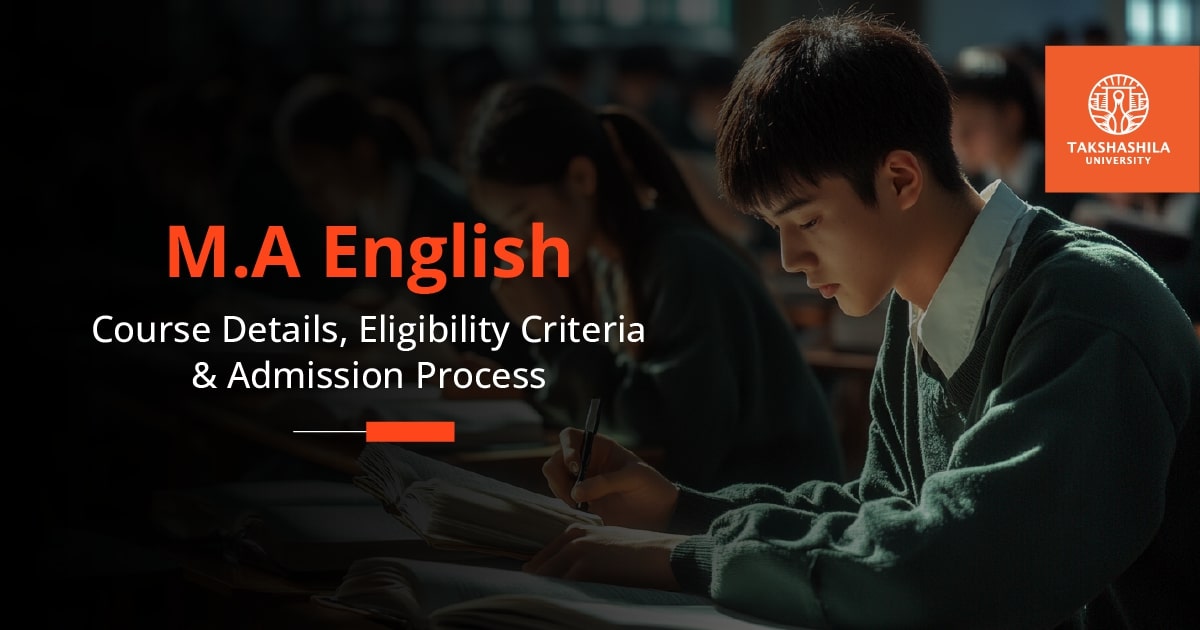Introduction to M A English
M A English course is a postgraduate course that offers in-depth study of English literature, language, and their cultural significance. It is ideal for students passionate about analyzing literary works, exploring linguistic structures, and understanding the connection between literature and culture.
At Takshashila Engineering College, the program blends literature, cultural studies, and creative writing, equipping students for careers in academia, publishing, media, and more.
In this article, we’ll explore all the essential details about M.A. English: Course Details, Eligibility Criteria, and Admission Proces

Overview of the M.A English Course
The course of M.A English is 2 years in most cases with four semesters. The vast syllabus includes ancient literature, modern literature, linguistics, literary criticism, and many developing inter-discipline subjects. Students acquire skills such as text analysis competence, understanding of context or periods in which the examined literary works were produced, and theoretical interpretation of different concepts, leading to the development of the minds preparing them for the job market.
Critical Concepts in M.A English
M.A English would cover key and advanced concepts which include but are not limited to the following;
- Literary Theory and Criticism: The Place of Structuralism, post-colonial, feminism and Deconstruction in Understanding the text effectively.
- World Literature: The study of literary works from different cultural and historical settings.
- Linguistics and language studies: Reading the arrangement and the development of the English language.
- Creative Writing: Gaining professional skills in Storytelling and Writing Fiction, Poetry and Drama.
- Research Methodology: Acquisition of procedures and methods for academic research and thesis writing.
Emerging Fields in English Studies
The field of English studies continues to evolve, incorporating new and dynamic areas:
- Digital Humanities: A combination of literature and computer technology; a study that uses data and applies it to ensure the creation of archives.
- Eco-criticism: Interpretation of literary texts about the issues of environment.
- Media and Film Studies: Focusing on creative narratives in film and other visual representations, cultural studies aim to find expression in literature.
- Gender and Cultural Studies: Examining the reciprocal relationship between literature and social construction and social processes.
Career Opportunities in English
An M.A English degree opens doors to diverse career options:
- Academia: A teacher at a school, college, or university.
- Publishing: Participating in editing, proofreading, and enrolling writers.
- Journalism: Employment as reporters, editors and writers in print and online media.
- Corporate Communication: In doing public relations, branding, and technical writing.
- Creative Writing: As novelists, poets, scriptwriters, and so forth.
- Civil Services: Good communication and analytical skills can significantly assist in competitive examinations like the UPSC.
Eligibility Criteria for M.A English
Academic Requirements
- A Bachelor’s degree in English or a related field with at least 50-60% aggregate marks.
- Proficiency in English demonstrated through undergraduate coursework or entrance exams.
Age and Other Considerations
- There is no upper age limit, as fresh graduates and professionals can apply.
Skills Required for M.A English Students
- Ability to think analytically and critically or reason with the available information.
- Possessing creativity and invariably a knack for writing.
- Ability to speak, write and converse in English fluently.
Admission Process for M.A English
Entrance Exams and Application Process
- Entrance Exams: Certain entrance tests, such as DUET and CUET-PG, are carried out by universities in some countries to assess candidates’ qualifications in languages and literature.
- Application Process: A formal application must be submitted with academic credentials, letters of purpose, and grades obtained in relevant examinations.
- Personal Interviews: Selected candidates may also go through interviews to explain their deep interest in books and literature and the program selection.
Curriculum and Course Structure
Year-wise Breakdown of Subjects
Year 1:
- British Literature (Chaucer to the Modern Age)
- Literary Theory and Criticism
- Indian Writing in English
- Language and Linguistics
Year 2:
- American and African Literature
- Gender Studies and Feminist Theory
- Research Methodology and Dissertation
- Electives: Creative Writing, Translation Studies, or Comparative Literature
Top Institutions for M.A English
Some of the top institutions offering M.A English programs include:
- University of Delhi
- Jawaharlal Nehru University
- Jadavpur University
- University of Hyderabad
- Takshashila Engineering College
Scope and Future for M.A English Graduates
The world always needs competent writers, efficient communicators, and critical minds, making M.An English graduates relevant. They work in universities, publication firms, media houses, and corporate communications. Furthermore, the course allows students to pursue an M.Phil. or even a Ph.D., which elevates them to a status that commands teaching and research.
Laboratory and Practical Training
Though M.A. English is mainly theoretical, some programs are designed to include workshops, seminars, and even internships. These practical parts enable the students to use their capabilities in other areas, such as literary, publishing, and media professions.
Benefits of Studying M.A English
- It promotes flexibility and creativity and assists as a way of communicating.
- It provides a variety of job fields for the student in terms of specialisation.
- It paves the way for more appreciation of cultural and literate heritage.
Challenges Faced by M.A English Students
- I am achieving a perfect balance between academic analytical thinking and the creative literary writing part.
- For instance, I have to rewrite the way I work to fit into cultural or even media studies parameters.
- A job search exists in industries such as publishing and media within competition.
Postgraduate and Research Opportunities
Graduates can explore:
- M.Phil. or Ph.D. in English. led them to research and academia jobs.
- Creative Writing Programs: They are defined to sharpen skills in story-telling and publishing.
- Certifications in fields such as content writing, digital marketing or technical writing.
Comparison with Other Arts Degrees
In this regard, M.A. English differs from the M.A. programs in Economics or Psychology since the latter stresses operations and numbers rather more than culture and language. This mainly makes it suitable for students who are passionate about language, creativity and human expressions.
Conclusion
A student obtaining an M.A English degree from Takshashila Engineering College unlocks them to a myriad of opportunities in literature, media and the the academic world. Combining elements of classic book analysis with modern practices, the program prepares students for successful employment in rapidly developing versatile spheres.
Graduates are articulate, lively thinkers, effective communicators, and professional people who can contribute positively to their society.
Want to know more about M.A. English Feel free to contact our mentor today at Takshahila Engineering College!
FAQ
Q1: How long does the M.A. English program take?
A1: It takes two years, that is, four semesters, to complete the program.
Q2: Are non-English speaking students eligible to apply for an M.A. in English?
A2: Indeed, but only when a student qualifies for them and such courses are taught in English.
Q3: What are the options available in M.A. English?
A3: Assignments offered are Creative Writing, Translation Studies, and Comparative Literature.
Q4: Can I do research after completing the M.A. English course?
A4: M.Phil., Ph.D., or the students might engage in interdisciplinary work in culture, new media, and digital humanities.
Q5: Is there some practice assignment as part of the curriculum?
A5: Most of them have internships, workshops and dissertation initiatives.
Q6: What are the probable job scenarios after M.A. English?
A6: They can teach and engage in publication, journalism, corporate communication, and creative writing, among other duties.






